Education Council's Code: Ethical Implications of Relationships
VerifiedAdded on 2023/06/04
|13
|3534
|409
Essay
AI Summary
This essay delves into the significance of professional, respectful, and collaborative relationships among educators, students, administrators, and the community, emphasizing the teacher's role in fostering a supportive learning environment. It examines the impact of teacher relationships, particularly concerning sexuality and personal views, on education, highlighting the necessity for positive and professional interactions among colleagues. The essay further discusses the importance of value education in schools, teacher reflection for developing educational knowledge, and the role of school values in shaping teacher community. It underscores the need for educators to engage in proactive, student-centered reflection within socio-historical and institutional settings, promoting continuous improvement and ethical conduct in educational practices. Desklib provides access to this essay along with a wide range of study resources including past papers and solved assignments to support students' learning journey.
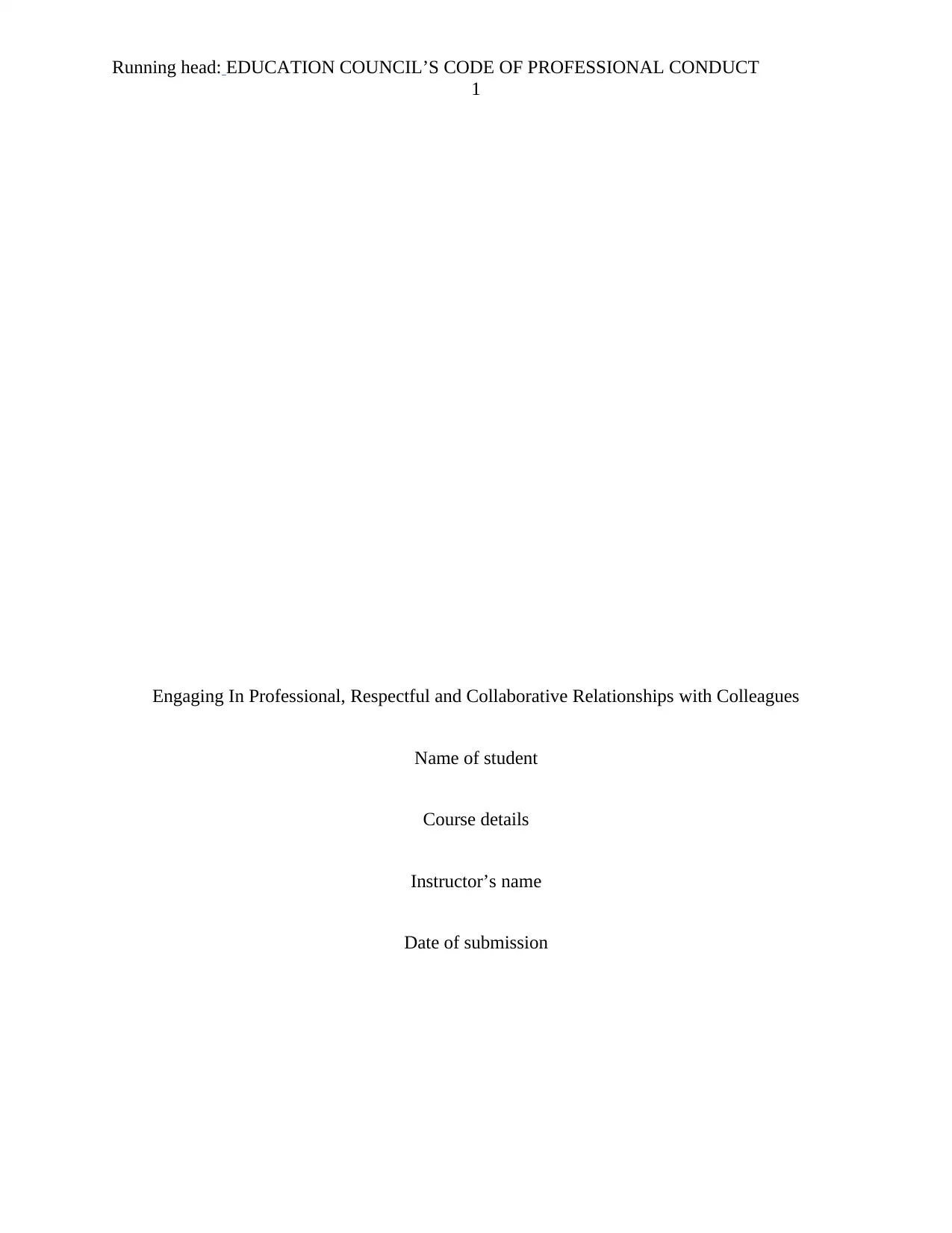
Running head: EDUCATION COUNCIL’S CODE OF PROFESSIONAL CONDUCT
1
Engaging In Professional, Respectful and Collaborative Relationships with Colleagues
Name of student
Course details
Instructor’s name
Date of submission
1
Engaging In Professional, Respectful and Collaborative Relationships with Colleagues
Name of student
Course details
Instructor’s name
Date of submission
Paraphrase This Document
Need a fresh take? Get an instant paraphrase of this document with our AI Paraphraser
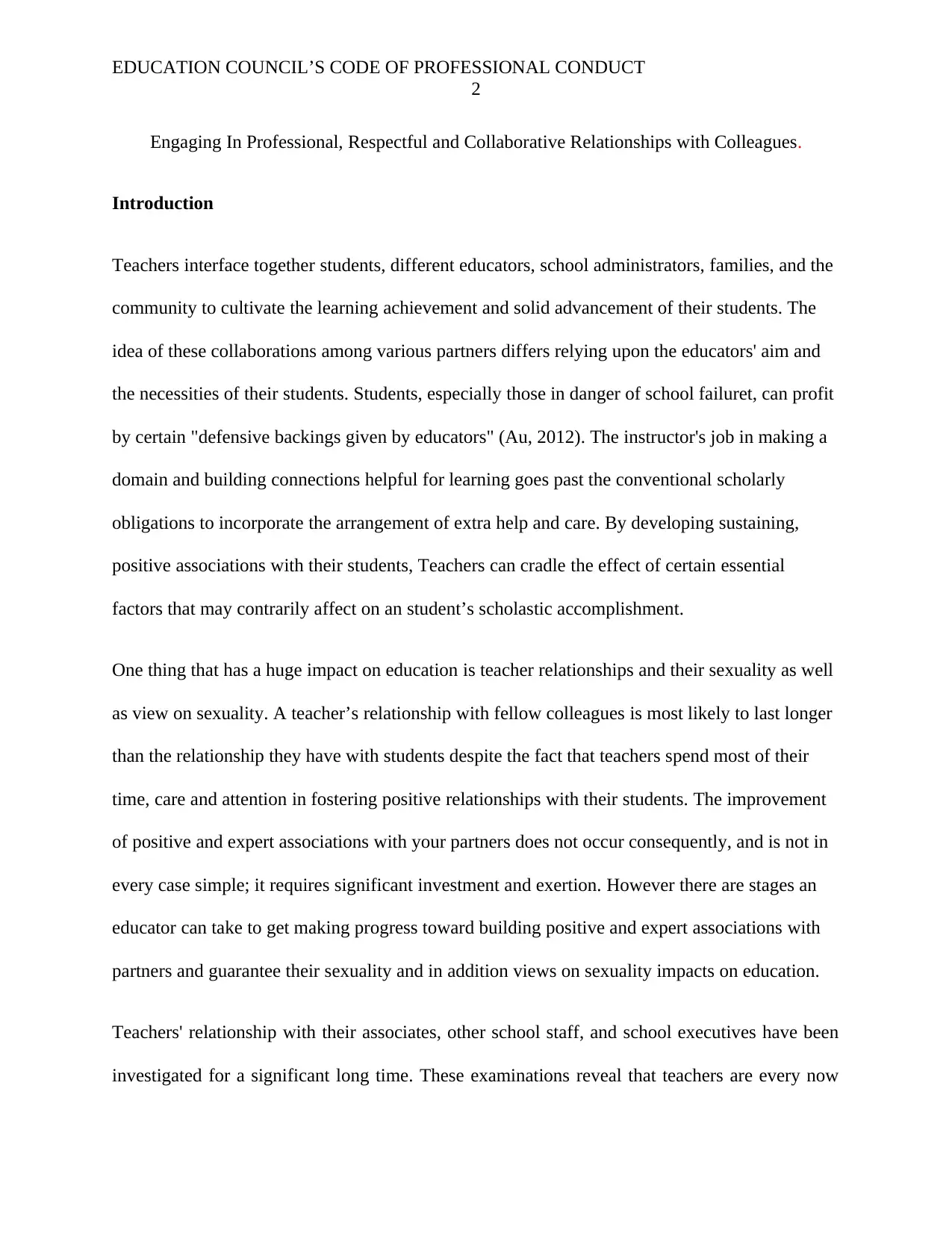
EDUCATION COUNCIL’S CODE OF PROFESSIONAL CONDUCT
2
Engaging In Professional, Respectful and Collaborative Relationships with Colleagues.
Introduction
Teachers interface together students, different educators, school administrators, families, and the
community to cultivate the learning achievement and solid advancement of their students. The
idea of these collaborations among various partners differs relying upon the educators' aim and
the necessities of their students. Students, especially those in danger of school failuret, can profit
by certain "defensive backings given by educators" (Au, 2012). The instructor's job in making a
domain and building connections helpful for learning goes past the conventional scholarly
obligations to incorporate the arrangement of extra help and care. By developing sustaining,
positive associations with their students, Teachers can cradle the effect of certain essential
factors that may contrarily affect on an student’s scholastic accomplishment.
One thing that has a huge impact on education is teacher relationships and their sexuality as well
as view on sexuality. A teacher’s relationship with fellow colleagues is most likely to last longer
than the relationship they have with students despite the fact that teachers spend most of their
time, care and attention in fostering positive relationships with their students. The improvement
of positive and expert associations with your partners does not occur consequently, and is not in
every case simple; it requires significant investment and exertion. However there are stages an
educator can take to get making progress toward building positive and expert associations with
partners and guarantee their sexuality and in addition views on sexuality impacts on education.
Teachers' relationship with their associates, other school staff, and school executives have been
investigated for a significant long time. These examinations reveal that teachers are every now
2
Engaging In Professional, Respectful and Collaborative Relationships with Colleagues.
Introduction
Teachers interface together students, different educators, school administrators, families, and the
community to cultivate the learning achievement and solid advancement of their students. The
idea of these collaborations among various partners differs relying upon the educators' aim and
the necessities of their students. Students, especially those in danger of school failuret, can profit
by certain "defensive backings given by educators" (Au, 2012). The instructor's job in making a
domain and building connections helpful for learning goes past the conventional scholarly
obligations to incorporate the arrangement of extra help and care. By developing sustaining,
positive associations with their students, Teachers can cradle the effect of certain essential
factors that may contrarily affect on an student’s scholastic accomplishment.
One thing that has a huge impact on education is teacher relationships and their sexuality as well
as view on sexuality. A teacher’s relationship with fellow colleagues is most likely to last longer
than the relationship they have with students despite the fact that teachers spend most of their
time, care and attention in fostering positive relationships with their students. The improvement
of positive and expert associations with your partners does not occur consequently, and is not in
every case simple; it requires significant investment and exertion. However there are stages an
educator can take to get making progress toward building positive and expert associations with
partners and guarantee their sexuality and in addition views on sexuality impacts on education.
Teachers' relationship with their associates, other school staff, and school executives have been
investigated for a significant long time. These examinations reveal that teachers are every now
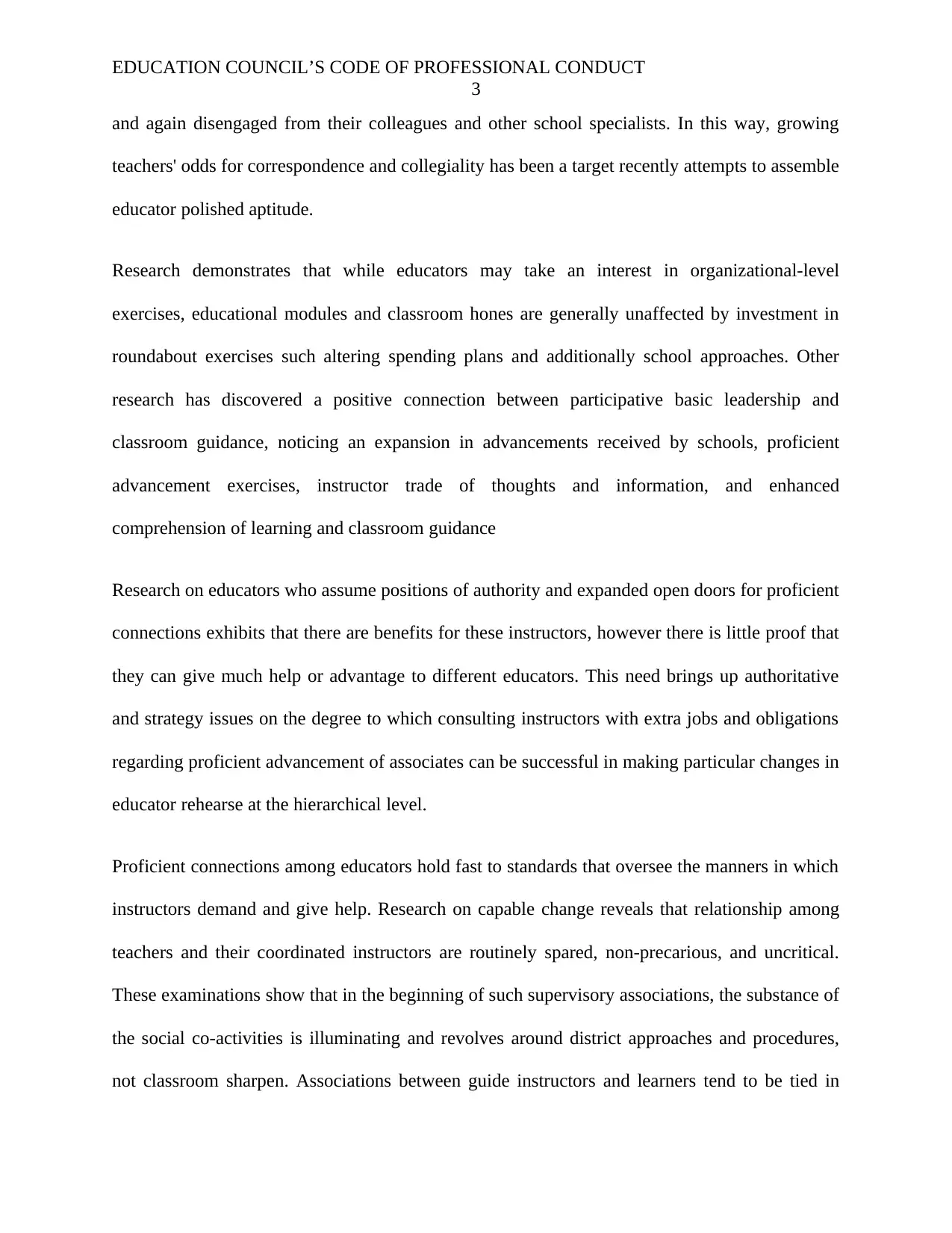
EDUCATION COUNCIL’S CODE OF PROFESSIONAL CONDUCT
3
and again disengaged from their colleagues and other school specialists. In this way, growing
teachers' odds for correspondence and collegiality has been a target recently attempts to assemble
educator polished aptitude.
Research demonstrates that while educators may take an interest in organizational-level
exercises, educational modules and classroom hones are generally unaffected by investment in
roundabout exercises such altering spending plans and additionally school approaches. Other
research has discovered a positive connection between participative basic leadership and
classroom guidance, noticing an expansion in advancements received by schools, proficient
advancement exercises, instructor trade of thoughts and information, and enhanced
comprehension of learning and classroom guidance
Research on educators who assume positions of authority and expanded open doors for proficient
connections exhibits that there are benefits for these instructors, however there is little proof that
they can give much help or advantage to different educators. This need brings up authoritative
and strategy issues on the degree to which consulting instructors with extra jobs and obligations
regarding proficient advancement of associates can be successful in making particular changes in
educator rehearse at the hierarchical level.
Proficient connections among educators hold fast to standards that oversee the manners in which
instructors demand and give help. Research on capable change reveals that relationship among
teachers and their coordinated instructors are routinely spared, non-precarious, and uncritical.
These examinations show that in the beginning of such supervisory associations, the substance of
the social co-activities is illuminating and revolves around district approaches and procedures,
not classroom sharpen. Associations between guide instructors and learners tend to be tied in
3
and again disengaged from their colleagues and other school specialists. In this way, growing
teachers' odds for correspondence and collegiality has been a target recently attempts to assemble
educator polished aptitude.
Research demonstrates that while educators may take an interest in organizational-level
exercises, educational modules and classroom hones are generally unaffected by investment in
roundabout exercises such altering spending plans and additionally school approaches. Other
research has discovered a positive connection between participative basic leadership and
classroom guidance, noticing an expansion in advancements received by schools, proficient
advancement exercises, instructor trade of thoughts and information, and enhanced
comprehension of learning and classroom guidance
Research on educators who assume positions of authority and expanded open doors for proficient
connections exhibits that there are benefits for these instructors, however there is little proof that
they can give much help or advantage to different educators. This need brings up authoritative
and strategy issues on the degree to which consulting instructors with extra jobs and obligations
regarding proficient advancement of associates can be successful in making particular changes in
educator rehearse at the hierarchical level.
Proficient connections among educators hold fast to standards that oversee the manners in which
instructors demand and give help. Research on capable change reveals that relationship among
teachers and their coordinated instructors are routinely spared, non-precarious, and uncritical.
These examinations show that in the beginning of such supervisory associations, the substance of
the social co-activities is illuminating and revolves around district approaches and procedures,
not classroom sharpen. Associations between guide instructors and learners tend to be tied in
⊘ This is a preview!⊘
Do you want full access?
Subscribe today to unlock all pages.

Trusted by 1+ million students worldwide
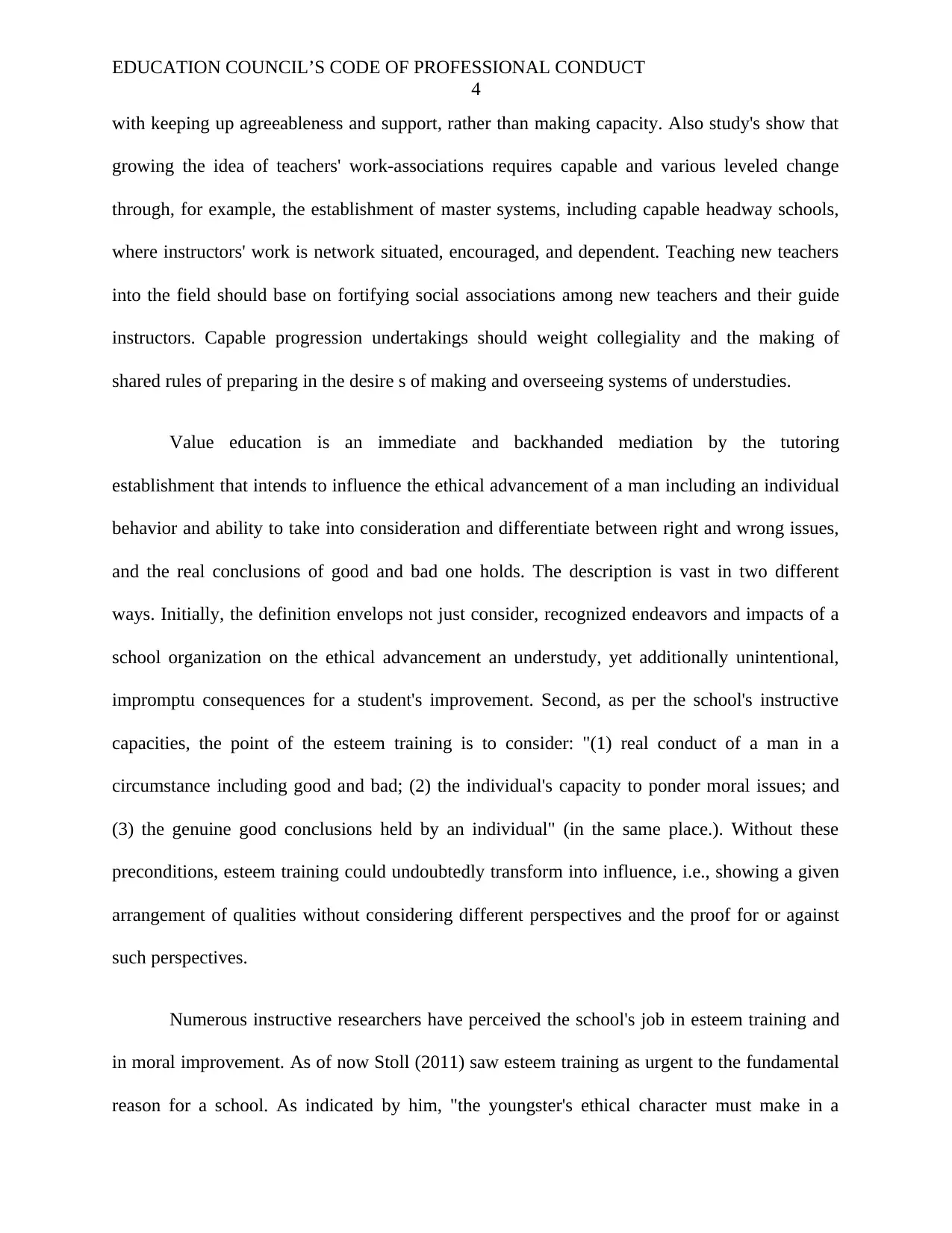
EDUCATION COUNCIL’S CODE OF PROFESSIONAL CONDUCT
4
with keeping up agreeableness and support, rather than making capacity. Also study's show that
growing the idea of teachers' work-associations requires capable and various leveled change
through, for example, the establishment of master systems, including capable headway schools,
where instructors' work is network situated, encouraged, and dependent. Teaching new teachers
into the field should base on fortifying social associations among new teachers and their guide
instructors. Capable progression undertakings should weight collegiality and the making of
shared rules of preparing in the desire s of making and overseeing systems of understudies.
Value education is an immediate and backhanded mediation by the tutoring
establishment that intends to influence the ethical advancement of a man including an individual
behavior and ability to take into consideration and differentiate between right and wrong issues,
and the real conclusions of good and bad one holds. The description is vast in two different
ways. Initially, the definition envelops not just consider, recognized endeavors and impacts of a
school organization on the ethical advancement an understudy, yet additionally unintentional,
impromptu consequences for a student's improvement. Second, as per the school's instructive
capacities, the point of the esteem training is to consider: "(1) real conduct of a man in a
circumstance including good and bad; (2) the individual's capacity to ponder moral issues; and
(3) the genuine good conclusions held by an individual" (in the same place.). Without these
preconditions, esteem training could undoubtedly transform into influence, i.e., showing a given
arrangement of qualities without considering different perspectives and the proof for or against
such perspectives.
Numerous instructive researchers have perceived the school's job in esteem training and
in moral improvement. As of now Stoll (2011) saw esteem training as urgent to the fundamental
reason for a school. As indicated by him, "the youngster's ethical character must make in a
4
with keeping up agreeableness and support, rather than making capacity. Also study's show that
growing the idea of teachers' work-associations requires capable and various leveled change
through, for example, the establishment of master systems, including capable headway schools,
where instructors' work is network situated, encouraged, and dependent. Teaching new teachers
into the field should base on fortifying social associations among new teachers and their guide
instructors. Capable progression undertakings should weight collegiality and the making of
shared rules of preparing in the desire s of making and overseeing systems of understudies.
Value education is an immediate and backhanded mediation by the tutoring
establishment that intends to influence the ethical advancement of a man including an individual
behavior and ability to take into consideration and differentiate between right and wrong issues,
and the real conclusions of good and bad one holds. The description is vast in two different
ways. Initially, the definition envelops not just consider, recognized endeavors and impacts of a
school organization on the ethical advancement an understudy, yet additionally unintentional,
impromptu consequences for a student's improvement. Second, as per the school's instructive
capacities, the point of the esteem training is to consider: "(1) real conduct of a man in a
circumstance including good and bad; (2) the individual's capacity to ponder moral issues; and
(3) the genuine good conclusions held by an individual" (in the same place.). Without these
preconditions, esteem training could undoubtedly transform into influence, i.e., showing a given
arrangement of qualities without considering different perspectives and the proof for or against
such perspectives.
Numerous instructive researchers have perceived the school's job in esteem training and
in moral improvement. As of now Stoll (2011) saw esteem training as urgent to the fundamental
reason for a school. As indicated by him, "the youngster's ethical character must make in a
Paraphrase This Document
Need a fresh take? Get an instant paraphrase of this document with our AI Paraphraser
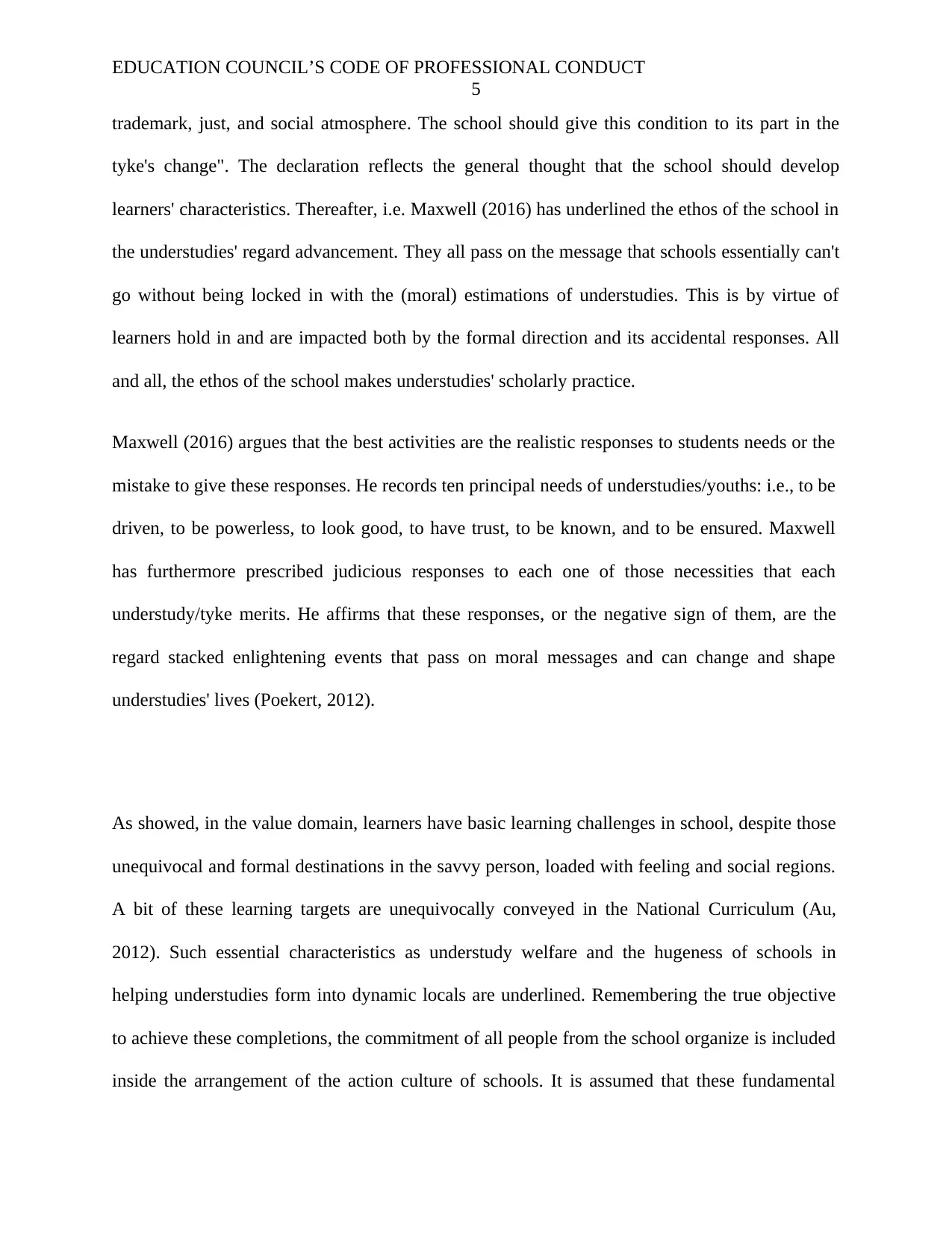
EDUCATION COUNCIL’S CODE OF PROFESSIONAL CONDUCT
5
trademark, just, and social atmosphere. The school should give this condition to its part in the
tyke's change". The declaration reflects the general thought that the school should develop
learners' characteristics. Thereafter, i.e. Maxwell (2016) has underlined the ethos of the school in
the understudies' regard advancement. They all pass on the message that schools essentially can't
go without being locked in with the (moral) estimations of understudies. This is by virtue of
learners hold in and are impacted both by the formal direction and its accidental responses. All
and all, the ethos of the school makes understudies' scholarly practice.
Maxwell (2016) argues that the best activities are the realistic responses to students needs or the
mistake to give these responses. He records ten principal needs of understudies/youths: i.e., to be
driven, to be powerless, to look good, to have trust, to be known, and to be ensured. Maxwell
has furthermore prescribed judicious responses to each one of those necessities that each
understudy/tyke merits. He affirms that these responses, or the negative sign of them, are the
regard stacked enlightening events that pass on moral messages and can change and shape
understudies' lives (Poekert, 2012).
As showed, in the value domain, learners have basic learning challenges in school, despite those
unequivocal and formal destinations in the savvy person, loaded with feeling and social regions.
A bit of these learning targets are unequivocally conveyed in the National Curriculum (Au,
2012). Such essential characteristics as understudy welfare and the hugeness of schools in
helping understudies form into dynamic locals are underlined. Remembering the true objective
to achieve these completions, the commitment of all people from the school organize is included
inside the arrangement of the action culture of schools. It is assumed that these fundamental
5
trademark, just, and social atmosphere. The school should give this condition to its part in the
tyke's change". The declaration reflects the general thought that the school should develop
learners' characteristics. Thereafter, i.e. Maxwell (2016) has underlined the ethos of the school in
the understudies' regard advancement. They all pass on the message that schools essentially can't
go without being locked in with the (moral) estimations of understudies. This is by virtue of
learners hold in and are impacted both by the formal direction and its accidental responses. All
and all, the ethos of the school makes understudies' scholarly practice.
Maxwell (2016) argues that the best activities are the realistic responses to students needs or the
mistake to give these responses. He records ten principal needs of understudies/youths: i.e., to be
driven, to be powerless, to look good, to have trust, to be known, and to be ensured. Maxwell
has furthermore prescribed judicious responses to each one of those necessities that each
understudy/tyke merits. He affirms that these responses, or the negative sign of them, are the
regard stacked enlightening events that pass on moral messages and can change and shape
understudies' lives (Poekert, 2012).
As showed, in the value domain, learners have basic learning challenges in school, despite those
unequivocal and formal destinations in the savvy person, loaded with feeling and social regions.
A bit of these learning targets are unequivocally conveyed in the National Curriculum (Au,
2012). Such essential characteristics as understudy welfare and the hugeness of schools in
helping understudies form into dynamic locals are underlined. Remembering the true objective
to achieve these completions, the commitment of all people from the school organize is included
inside the arrangement of the action culture of schools. It is assumed that these fundamental
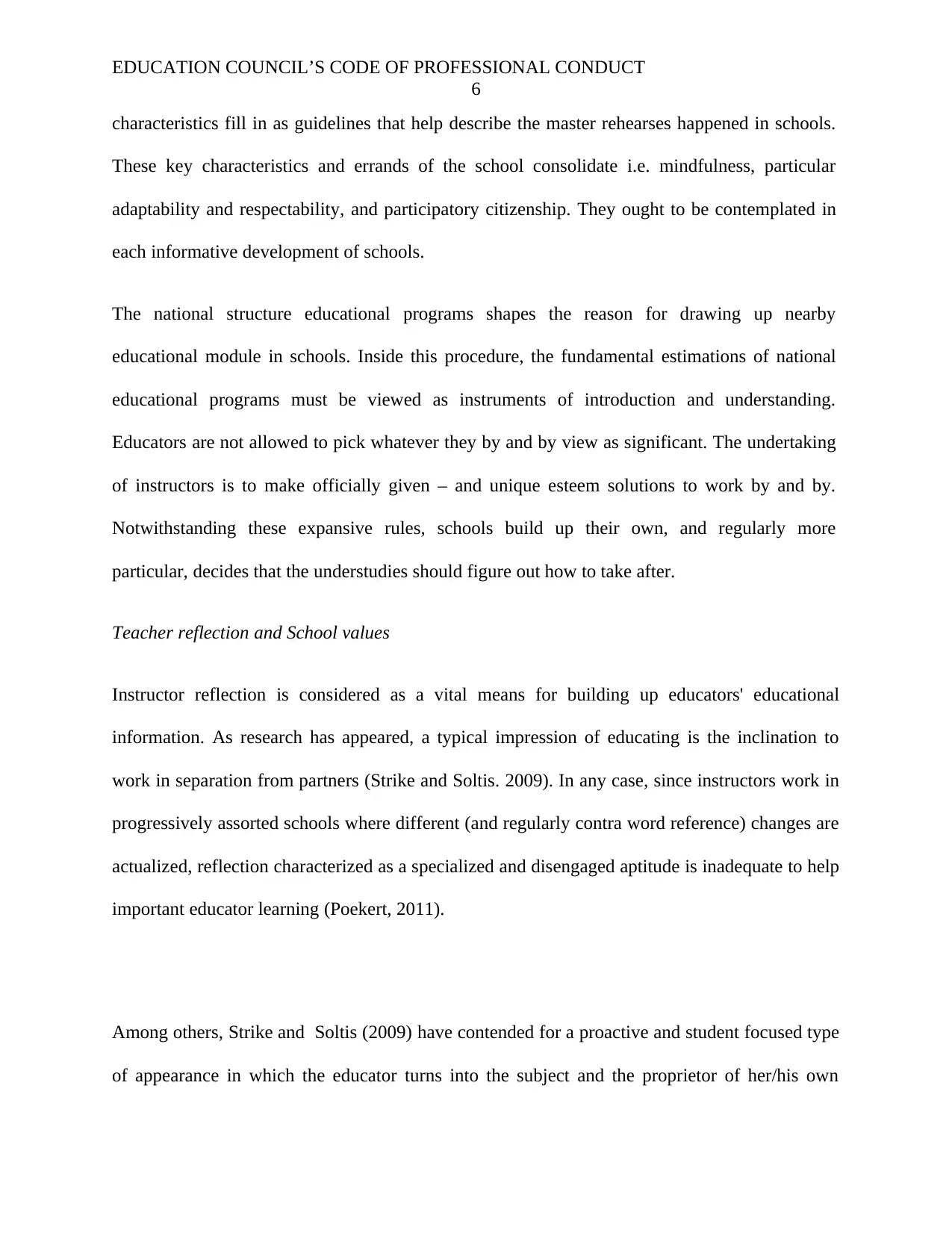
EDUCATION COUNCIL’S CODE OF PROFESSIONAL CONDUCT
6
characteristics fill in as guidelines that help describe the master rehearses happened in schools.
These key characteristics and errands of the school consolidate i.e. mindfulness, particular
adaptability and respectability, and participatory citizenship. They ought to be contemplated in
each informative development of schools.
The national structure educational programs shapes the reason for drawing up nearby
educational module in schools. Inside this procedure, the fundamental estimations of national
educational programs must be viewed as instruments of introduction and understanding.
Educators are not allowed to pick whatever they by and by view as significant. The undertaking
of instructors is to make officially given – and unique esteem solutions to work by and by.
Notwithstanding these expansive rules, schools build up their own, and regularly more
particular, decides that the understudies should figure out how to take after.
Teacher reflection and School values
Instructor reflection is considered as a vital means for building up educators' educational
information. As research has appeared, a typical impression of educating is the inclination to
work in separation from partners (Strike and Soltis. 2009). In any case, since instructors work in
progressively assorted schools where different (and regularly contra word reference) changes are
actualized, reflection characterized as a specialized and disengaged aptitude is inadequate to help
important educator learning (Poekert, 2011).
Among others, Strike and Soltis (2009) have contended for a proactive and student focused type
of appearance in which the educator turns into the subject and the proprietor of her/his own
6
characteristics fill in as guidelines that help describe the master rehearses happened in schools.
These key characteristics and errands of the school consolidate i.e. mindfulness, particular
adaptability and respectability, and participatory citizenship. They ought to be contemplated in
each informative development of schools.
The national structure educational programs shapes the reason for drawing up nearby
educational module in schools. Inside this procedure, the fundamental estimations of national
educational programs must be viewed as instruments of introduction and understanding.
Educators are not allowed to pick whatever they by and by view as significant. The undertaking
of instructors is to make officially given – and unique esteem solutions to work by and by.
Notwithstanding these expansive rules, schools build up their own, and regularly more
particular, decides that the understudies should figure out how to take after.
Teacher reflection and School values
Instructor reflection is considered as a vital means for building up educators' educational
information. As research has appeared, a typical impression of educating is the inclination to
work in separation from partners (Strike and Soltis. 2009). In any case, since instructors work in
progressively assorted schools where different (and regularly contra word reference) changes are
actualized, reflection characterized as a specialized and disengaged aptitude is inadequate to help
important educator learning (Poekert, 2011).
Among others, Strike and Soltis (2009) have contended for a proactive and student focused type
of appearance in which the educator turns into the subject and the proprietor of her/his own
⊘ This is a preview!⊘
Do you want full access?
Subscribe today to unlock all pages.

Trusted by 1+ million students worldwide
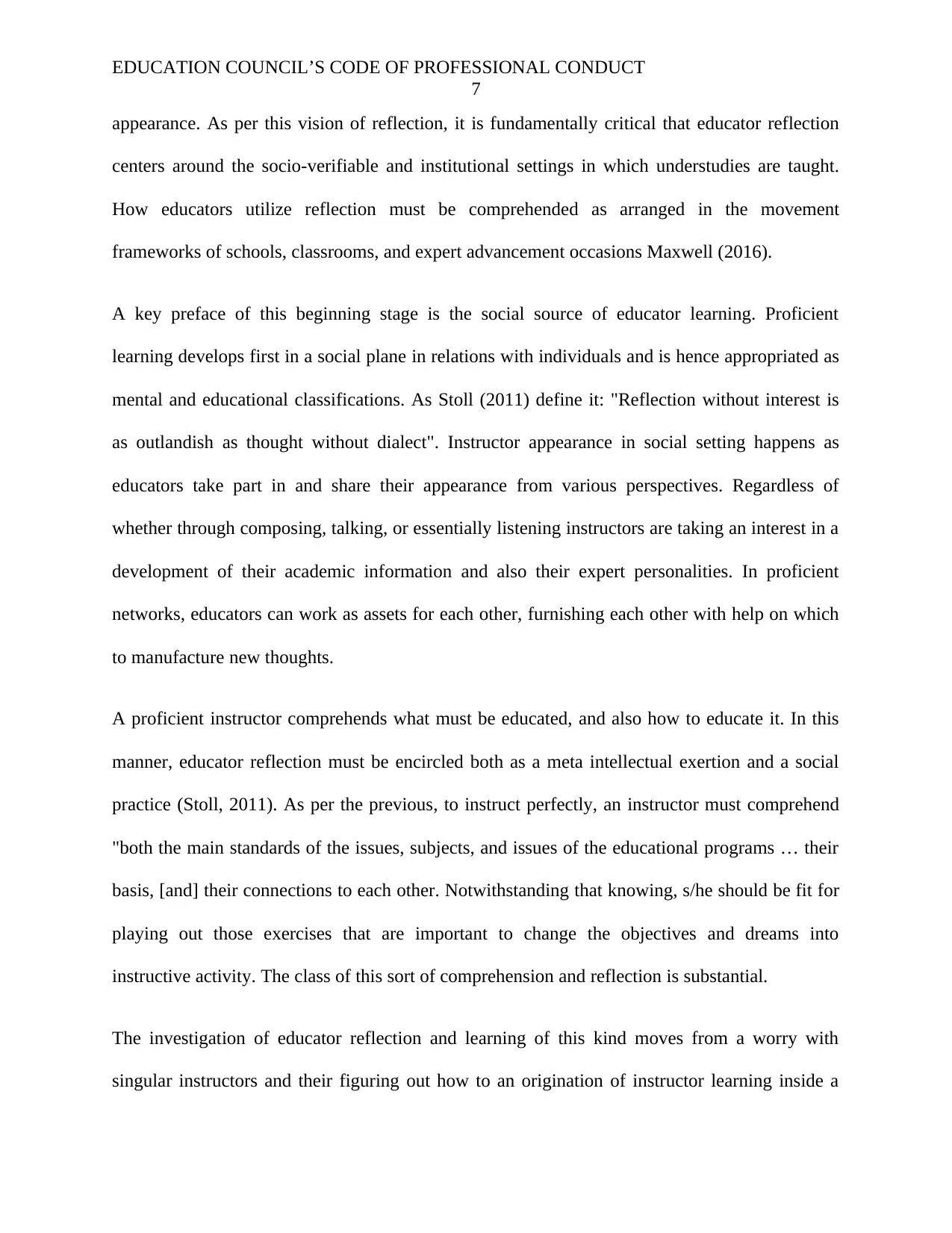
EDUCATION COUNCIL’S CODE OF PROFESSIONAL CONDUCT
7
appearance. As per this vision of reflection, it is fundamentally critical that educator reflection
centers around the socio-verifiable and institutional settings in which understudies are taught.
How educators utilize reflection must be comprehended as arranged in the movement
frameworks of schools, classrooms, and expert advancement occasions Maxwell (2016).
A key preface of this beginning stage is the social source of educator learning. Proficient
learning develops first in a social plane in relations with individuals and is hence appropriated as
mental and educational classifications. As Stoll (2011) define it: "Reflection without interest is
as outlandish as thought without dialect". Instructor appearance in social setting happens as
educators take part in and share their appearance from various perspectives. Regardless of
whether through composing, talking, or essentially listening instructors are taking an interest in a
development of their academic information and also their expert personalities. In proficient
networks, educators can work as assets for each other, furnishing each other with help on which
to manufacture new thoughts.
A proficient instructor comprehends what must be educated, and also how to educate it. In this
manner, educator reflection must be encircled both as a meta intellectual exertion and a social
practice (Stoll, 2011). As per the previous, to instruct perfectly, an instructor must comprehend
"both the main standards of the issues, subjects, and issues of the educational programs … their
basis, [and] their connections to each other. Notwithstanding that knowing, s/he should be fit for
playing out those exercises that are important to change the objectives and dreams into
instructive activity. The class of this sort of comprehension and reflection is substantial.
The investigation of educator reflection and learning of this kind moves from a worry with
singular instructors and their figuring out how to an origination of instructor learning inside a
7
appearance. As per this vision of reflection, it is fundamentally critical that educator reflection
centers around the socio-verifiable and institutional settings in which understudies are taught.
How educators utilize reflection must be comprehended as arranged in the movement
frameworks of schools, classrooms, and expert advancement occasions Maxwell (2016).
A key preface of this beginning stage is the social source of educator learning. Proficient
learning develops first in a social plane in relations with individuals and is hence appropriated as
mental and educational classifications. As Stoll (2011) define it: "Reflection without interest is
as outlandish as thought without dialect". Instructor appearance in social setting happens as
educators take part in and share their appearance from various perspectives. Regardless of
whether through composing, talking, or essentially listening instructors are taking an interest in a
development of their academic information and also their expert personalities. In proficient
networks, educators can work as assets for each other, furnishing each other with help on which
to manufacture new thoughts.
A proficient instructor comprehends what must be educated, and also how to educate it. In this
manner, educator reflection must be encircled both as a meta intellectual exertion and a social
practice (Stoll, 2011). As per the previous, to instruct perfectly, an instructor must comprehend
"both the main standards of the issues, subjects, and issues of the educational programs … their
basis, [and] their connections to each other. Notwithstanding that knowing, s/he should be fit for
playing out those exercises that are important to change the objectives and dreams into
instructive activity. The class of this sort of comprehension and reflection is substantial.
The investigation of educator reflection and learning of this kind moves from a worry with
singular instructors and their figuring out how to an origination of instructor learning inside a
Paraphrase This Document
Need a fresh take? Get an instant paraphrase of this document with our AI Paraphraser
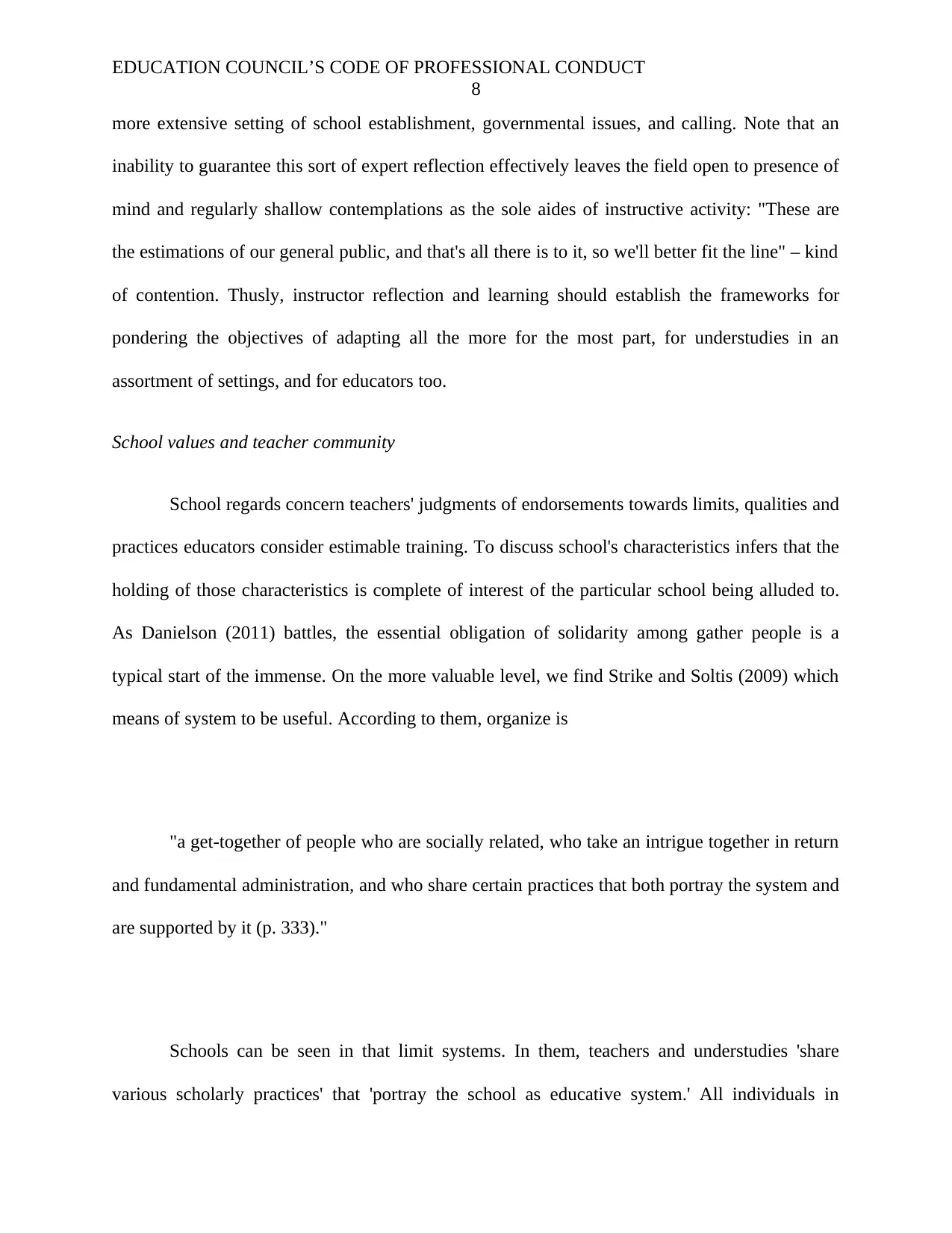
EDUCATION COUNCIL’S CODE OF PROFESSIONAL CONDUCT
8
more extensive setting of school establishment, governmental issues, and calling. Note that an
inability to guarantee this sort of expert reflection effectively leaves the field open to presence of
mind and regularly shallow contemplations as the sole aides of instructive activity: "These are
the estimations of our general public, and that's all there is to it, so we'll better fit the line" – kind
of contention. Thusly, instructor reflection and learning should establish the frameworks for
pondering the objectives of adapting all the more for the most part, for understudies in an
assortment of settings, and for educators too.
School values and teacher community
School regards concern teachers' judgments of endorsements towards limits, qualities and
practices educators consider estimable training. To discuss school's characteristics infers that the
holding of those characteristics is complete of interest of the particular school being alluded to.
As Danielson (2011) battles, the essential obligation of solidarity among gather people is a
typical start of the immense. On the more valuable level, we find Strike and Soltis (2009) which
means of system to be useful. According to them, organize is
"a get-together of people who are socially related, who take an intrigue together in return
and fundamental administration, and who share certain practices that both portray the system and
are supported by it (p. 333)."
Schools can be seen in that limit systems. In them, teachers and understudies 'share
various scholarly practices' that 'portray the school as educative system.' All individuals in
8
more extensive setting of school establishment, governmental issues, and calling. Note that an
inability to guarantee this sort of expert reflection effectively leaves the field open to presence of
mind and regularly shallow contemplations as the sole aides of instructive activity: "These are
the estimations of our general public, and that's all there is to it, so we'll better fit the line" – kind
of contention. Thusly, instructor reflection and learning should establish the frameworks for
pondering the objectives of adapting all the more for the most part, for understudies in an
assortment of settings, and for educators too.
School values and teacher community
School regards concern teachers' judgments of endorsements towards limits, qualities and
practices educators consider estimable training. To discuss school's characteristics infers that the
holding of those characteristics is complete of interest of the particular school being alluded to.
As Danielson (2011) battles, the essential obligation of solidarity among gather people is a
typical start of the immense. On the more valuable level, we find Strike and Soltis (2009) which
means of system to be useful. According to them, organize is
"a get-together of people who are socially related, who take an intrigue together in return
and fundamental administration, and who share certain practices that both portray the system and
are supported by it (p. 333)."
Schools can be seen in that limit systems. In them, teachers and understudies 'share
various scholarly practices' that 'portray the school as educative system.' All individuals in
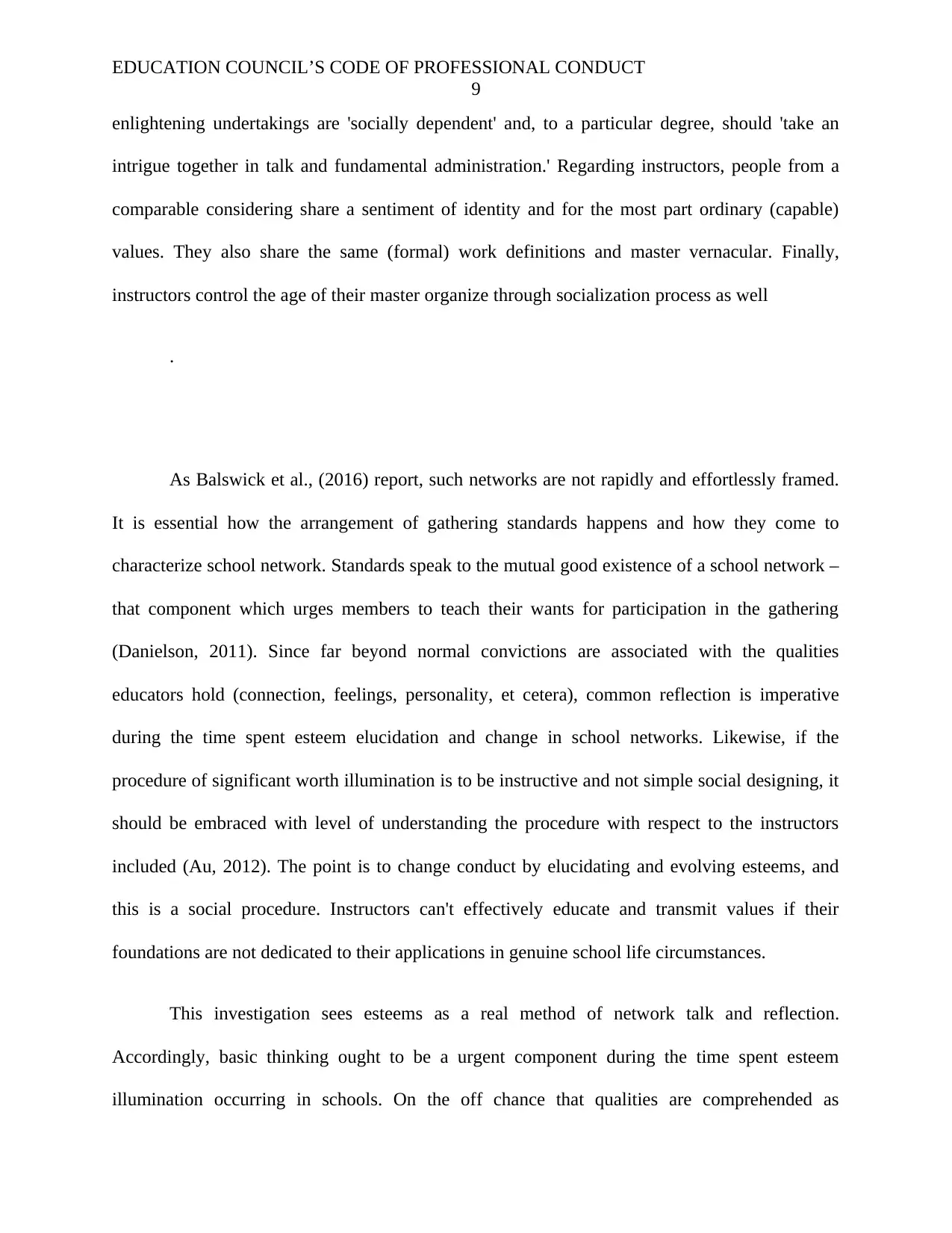
EDUCATION COUNCIL’S CODE OF PROFESSIONAL CONDUCT
9
enlightening undertakings are 'socially dependent' and, to a particular degree, should 'take an
intrigue together in talk and fundamental administration.' Regarding instructors, people from a
comparable considering share a sentiment of identity and for the most part ordinary (capable)
values. They also share the same (formal) work definitions and master vernacular. Finally,
instructors control the age of their master organize through socialization process as well
.
As Balswick et al., (2016) report, such networks are not rapidly and effortlessly framed.
It is essential how the arrangement of gathering standards happens and how they come to
characterize school network. Standards speak to the mutual good existence of a school network –
that component which urges members to teach their wants for participation in the gathering
(Danielson, 2011). Since far beyond normal convictions are associated with the qualities
educators hold (connection, feelings, personality, et cetera), common reflection is imperative
during the time spent esteem elucidation and change in school networks. Likewise, if the
procedure of significant worth illumination is to be instructive and not simple social designing, it
should be embraced with level of understanding the procedure with respect to the instructors
included (Au, 2012). The point is to change conduct by elucidating and evolving esteems, and
this is a social procedure. Instructors can't effectively educate and transmit values if their
foundations are not dedicated to their applications in genuine school life circumstances.
This investigation sees esteems as a real method of network talk and reflection.
Accordingly, basic thinking ought to be a urgent component during the time spent esteem
illumination occurring in schools. On the off chance that qualities are comprehended as
9
enlightening undertakings are 'socially dependent' and, to a particular degree, should 'take an
intrigue together in talk and fundamental administration.' Regarding instructors, people from a
comparable considering share a sentiment of identity and for the most part ordinary (capable)
values. They also share the same (formal) work definitions and master vernacular. Finally,
instructors control the age of their master organize through socialization process as well
.
As Balswick et al., (2016) report, such networks are not rapidly and effortlessly framed.
It is essential how the arrangement of gathering standards happens and how they come to
characterize school network. Standards speak to the mutual good existence of a school network –
that component which urges members to teach their wants for participation in the gathering
(Danielson, 2011). Since far beyond normal convictions are associated with the qualities
educators hold (connection, feelings, personality, et cetera), common reflection is imperative
during the time spent esteem elucidation and change in school networks. Likewise, if the
procedure of significant worth illumination is to be instructive and not simple social designing, it
should be embraced with level of understanding the procedure with respect to the instructors
included (Au, 2012). The point is to change conduct by elucidating and evolving esteems, and
this is a social procedure. Instructors can't effectively educate and transmit values if their
foundations are not dedicated to their applications in genuine school life circumstances.
This investigation sees esteems as a real method of network talk and reflection.
Accordingly, basic thinking ought to be a urgent component during the time spent esteem
illumination occurring in schools. On the off chance that qualities are comprehended as
⊘ This is a preview!⊘
Do you want full access?
Subscribe today to unlock all pages.

Trusted by 1+ million students worldwide
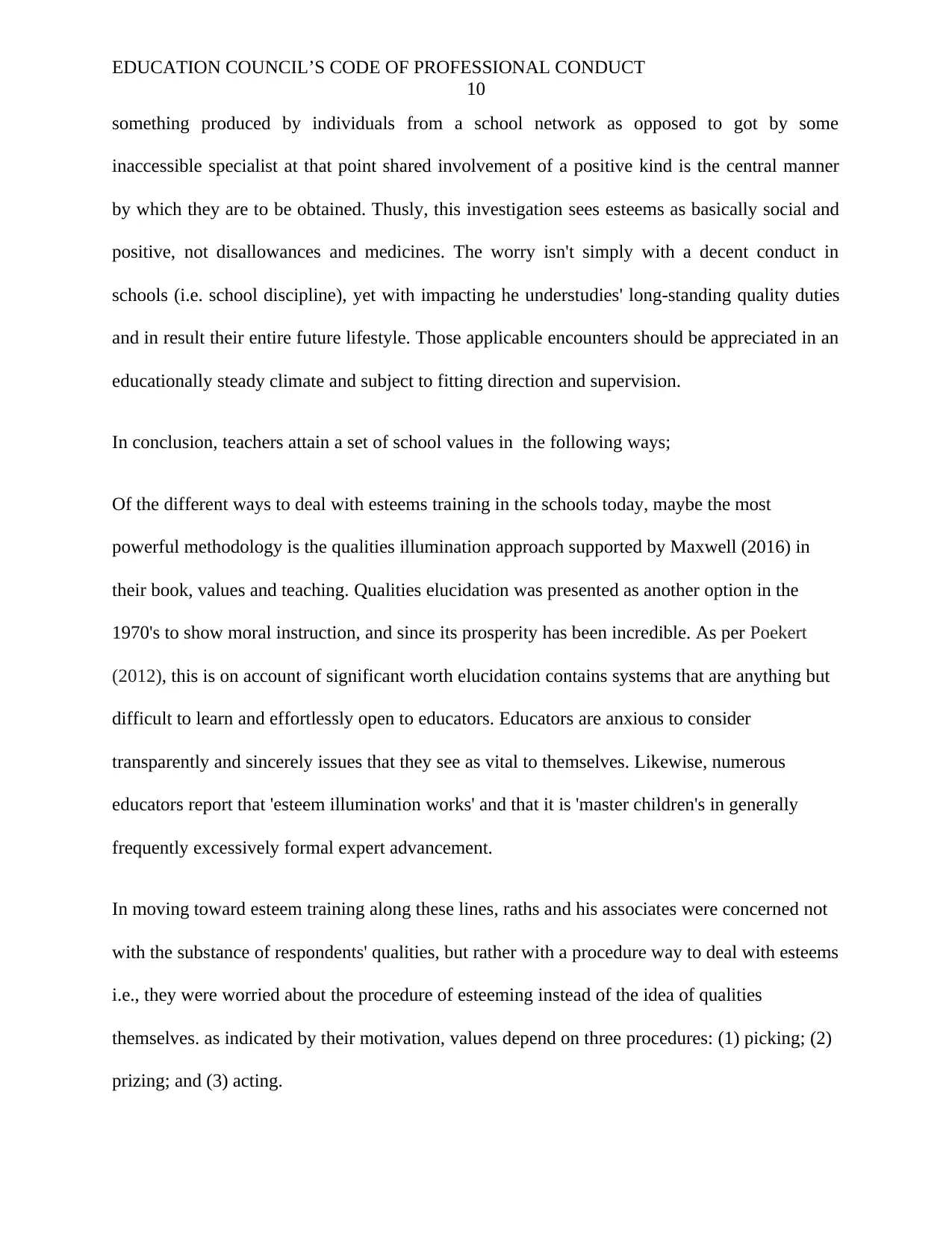
EDUCATION COUNCIL’S CODE OF PROFESSIONAL CONDUCT
10
something produced by individuals from a school network as opposed to got by some
inaccessible specialist at that point shared involvement of a positive kind is the central manner
by which they are to be obtained. Thusly, this investigation sees esteems as basically social and
positive, not disallowances and medicines. The worry isn't simply with a decent conduct in
schools (i.e. school discipline), yet with impacting he understudies' long-standing quality duties
and in result their entire future lifestyle. Those applicable encounters should be appreciated in an
educationally steady climate and subject to fitting direction and supervision.
In conclusion, teachers attain a set of school values in the following ways;
Of the different ways to deal with esteems training in the schools today, maybe the most
powerful methodology is the qualities illumination approach supported by Maxwell (2016) in
their book, values and teaching. Qualities elucidation was presented as another option in the
1970's to show moral instruction, and since its prosperity has been incredible. As per Poekert
(2012), this is on account of significant worth elucidation contains systems that are anything but
difficult to learn and effortlessly open to educators. Educators are anxious to consider
transparently and sincerely issues that they see as vital to themselves. Likewise, numerous
educators report that 'esteem illumination works' and that it is 'master children's in generally
frequently excessively formal expert advancement.
In moving toward esteem training along these lines, raths and his associates were concerned not
with the substance of respondents' qualities, but rather with a procedure way to deal with esteems
i.e., they were worried about the procedure of esteeming instead of the idea of qualities
themselves. as indicated by their motivation, values depend on three procedures: (1) picking; (2)
prizing; and (3) acting.
10
something produced by individuals from a school network as opposed to got by some
inaccessible specialist at that point shared involvement of a positive kind is the central manner
by which they are to be obtained. Thusly, this investigation sees esteems as basically social and
positive, not disallowances and medicines. The worry isn't simply with a decent conduct in
schools (i.e. school discipline), yet with impacting he understudies' long-standing quality duties
and in result their entire future lifestyle. Those applicable encounters should be appreciated in an
educationally steady climate and subject to fitting direction and supervision.
In conclusion, teachers attain a set of school values in the following ways;
Of the different ways to deal with esteems training in the schools today, maybe the most
powerful methodology is the qualities illumination approach supported by Maxwell (2016) in
their book, values and teaching. Qualities elucidation was presented as another option in the
1970's to show moral instruction, and since its prosperity has been incredible. As per Poekert
(2012), this is on account of significant worth elucidation contains systems that are anything but
difficult to learn and effortlessly open to educators. Educators are anxious to consider
transparently and sincerely issues that they see as vital to themselves. Likewise, numerous
educators report that 'esteem illumination works' and that it is 'master children's in generally
frequently excessively formal expert advancement.
In moving toward esteem training along these lines, raths and his associates were concerned not
with the substance of respondents' qualities, but rather with a procedure way to deal with esteems
i.e., they were worried about the procedure of esteeming instead of the idea of qualities
themselves. as indicated by their motivation, values depend on three procedures: (1) picking; (2)
prizing; and (3) acting.
Paraphrase This Document
Need a fresh take? Get an instant paraphrase of this document with our AI Paraphraser
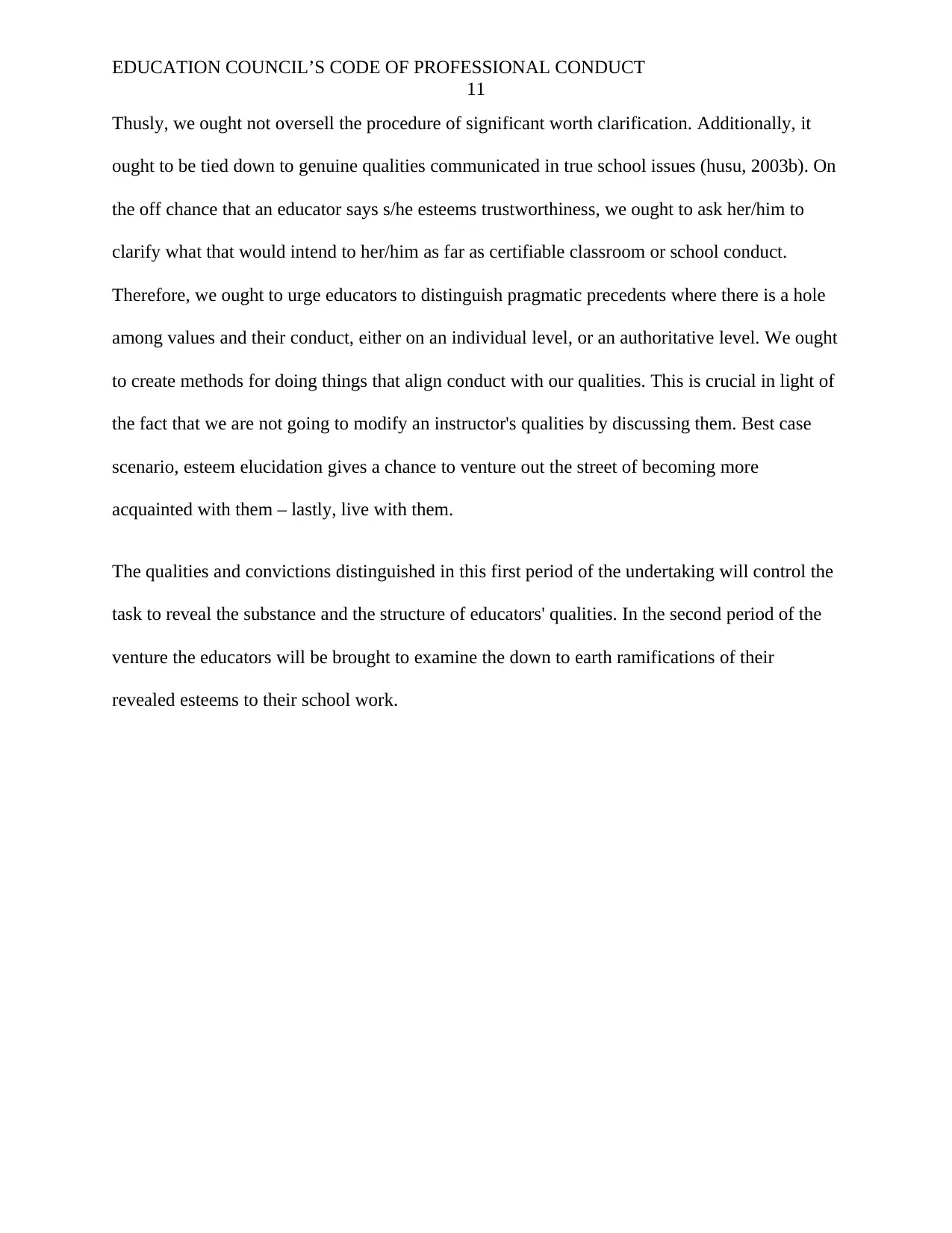
EDUCATION COUNCIL’S CODE OF PROFESSIONAL CONDUCT
11
Thusly, we ought not oversell the procedure of significant worth clarification. Additionally, it
ought to be tied down to genuine qualities communicated in true school issues (husu, 2003b). On
the off chance that an educator says s/he esteems trustworthiness, we ought to ask her/him to
clarify what that would intend to her/him as far as certifiable classroom or school conduct.
Therefore, we ought to urge educators to distinguish pragmatic precedents where there is a hole
among values and their conduct, either on an individual level, or an authoritative level. We ought
to create methods for doing things that align conduct with our qualities. This is crucial in light of
the fact that we are not going to modify an instructor's qualities by discussing them. Best case
scenario, esteem elucidation gives a chance to venture out the street of becoming more
acquainted with them – lastly, live with them.
The qualities and convictions distinguished in this first period of the undertaking will control the
task to reveal the substance and the structure of educators' qualities. In the second period of the
venture the educators will be brought to examine the down to earth ramifications of their
revealed esteems to their school work.
11
Thusly, we ought not oversell the procedure of significant worth clarification. Additionally, it
ought to be tied down to genuine qualities communicated in true school issues (husu, 2003b). On
the off chance that an educator says s/he esteems trustworthiness, we ought to ask her/him to
clarify what that would intend to her/him as far as certifiable classroom or school conduct.
Therefore, we ought to urge educators to distinguish pragmatic precedents where there is a hole
among values and their conduct, either on an individual level, or an authoritative level. We ought
to create methods for doing things that align conduct with our qualities. This is crucial in light of
the fact that we are not going to modify an instructor's qualities by discussing them. Best case
scenario, esteem elucidation gives a chance to venture out the street of becoming more
acquainted with them – lastly, live with them.
The qualities and convictions distinguished in this first period of the undertaking will control the
task to reveal the substance and the structure of educators' qualities. In the second period of the
venture the educators will be brought to examine the down to earth ramifications of their
revealed esteems to their school work.
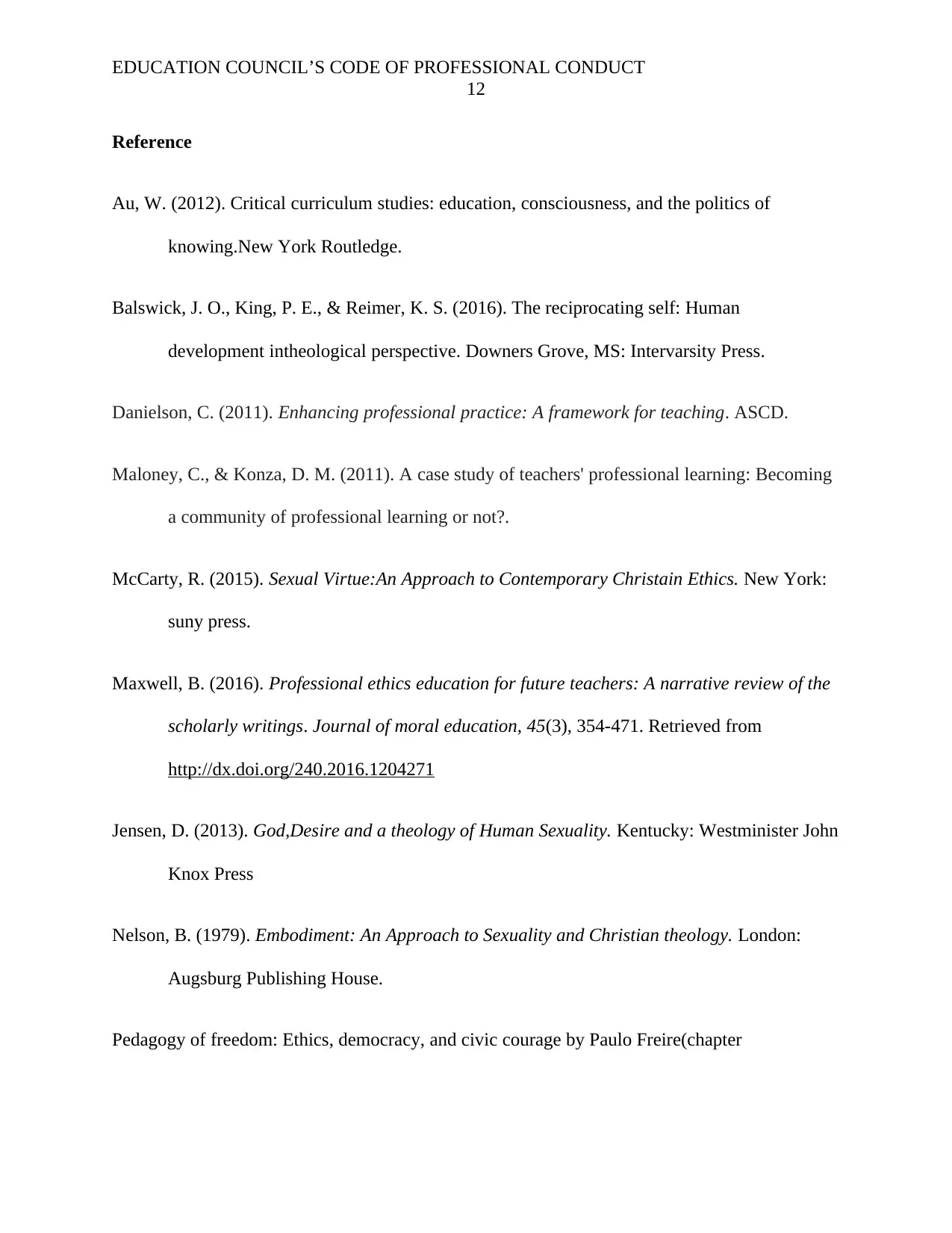
EDUCATION COUNCIL’S CODE OF PROFESSIONAL CONDUCT
12
Reference
Au, W. (2012). Critical curriculum studies: education, consciousness, and the politics of
knowing.New York Routledge.
Balswick, J. O., King, P. E., & Reimer, K. S. (2016). The reciprocating self: Human
development intheological perspective. Downers Grove, MS: Intervarsity Press.
Danielson, C. (2011). Enhancing professional practice: A framework for teaching. ASCD.
Maloney, C., & Konza, D. M. (2011). A case study of teachers' professional learning: Becoming
a community of professional learning or not?.
McCarty, R. (2015). Sexual Virtue:An Approach to Contemporary Christain Ethics. New York:
suny press.
Maxwell, B. (2016). Professional ethics education for future teachers: A narrative review of the
scholarly writings. Journal of moral education, 45(3), 354-471. Retrieved from
http://dx.doi.org/240.2016.1204271
Jensen, D. (2013). God,Desire and a theology of Human Sexuality. Kentucky: Westminister John
Knox Press
Nelson, B. (1979). Embodiment: An Approach to Sexuality and Christian theology. London:
Augsburg Publishing House.
Pedagogy of freedom: Ethics, democracy, and civic courage by Paulo Freire(chapter
12
Reference
Au, W. (2012). Critical curriculum studies: education, consciousness, and the politics of
knowing.New York Routledge.
Balswick, J. O., King, P. E., & Reimer, K. S. (2016). The reciprocating self: Human
development intheological perspective. Downers Grove, MS: Intervarsity Press.
Danielson, C. (2011). Enhancing professional practice: A framework for teaching. ASCD.
Maloney, C., & Konza, D. M. (2011). A case study of teachers' professional learning: Becoming
a community of professional learning or not?.
McCarty, R. (2015). Sexual Virtue:An Approach to Contemporary Christain Ethics. New York:
suny press.
Maxwell, B. (2016). Professional ethics education for future teachers: A narrative review of the
scholarly writings. Journal of moral education, 45(3), 354-471. Retrieved from
http://dx.doi.org/240.2016.1204271
Jensen, D. (2013). God,Desire and a theology of Human Sexuality. Kentucky: Westminister John
Knox Press
Nelson, B. (1979). Embodiment: An Approach to Sexuality and Christian theology. London:
Augsburg Publishing House.
Pedagogy of freedom: Ethics, democracy, and civic courage by Paulo Freire(chapter
⊘ This is a preview!⊘
Do you want full access?
Subscribe today to unlock all pages.

Trusted by 1+ million students worldwide
1 out of 13
Related Documents
Your All-in-One AI-Powered Toolkit for Academic Success.
+13062052269
info@desklib.com
Available 24*7 on WhatsApp / Email
![[object Object]](/_next/static/media/star-bottom.7253800d.svg)
Unlock your academic potential
Copyright © 2020–2025 A2Z Services. All Rights Reserved. Developed and managed by ZUCOL.





